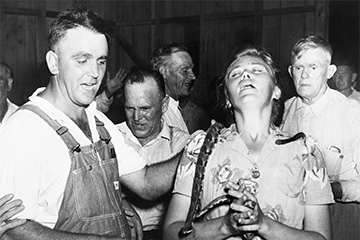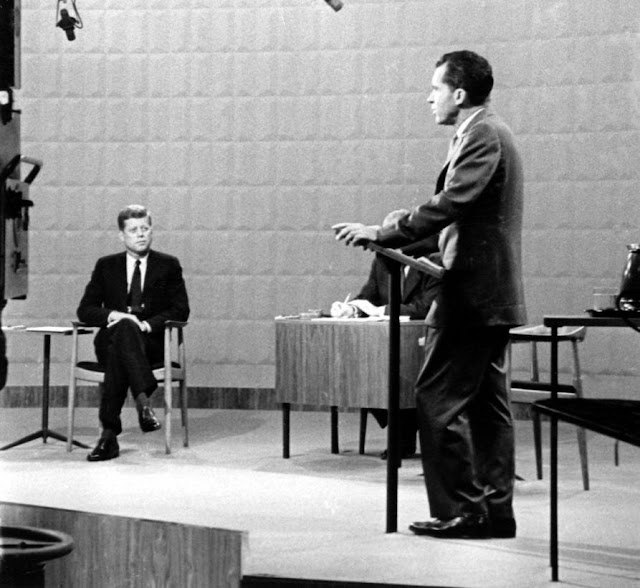It's been a little over a year
since Ed Gorman left us, taking with him my favorite fictional
small-town private-eye/lawyer Sam McCain, at
24 “the youngest and poorest lawyer” in town, leaving
us to wonder who's driving McCain's '57 red Ford ragtop, and whether
the beautiful Pamela Forrest is finally regretting having spurned his
eternal love for her,
and whom the handsome District Judge
Esme Anne Whitney (who
hired
his investigative services)
is now shooting with her endless supply of rubber bands, and who in
hell is
solving all of the murders in Black River Falls, Iowa, pop. 20,300.
We know for sure it’s not
the town idiot, Police Chief "Don't call me Cliffie!" Sykes
Jr.
Thinking
of Ed last week, missing his friendly generosity and the marvelous
characters (there are more
in the ensemble cast besides
the above
that make up the McCain
series), I had no choice but to pick one of my favorite episodes
for a reread, and it turned out to be Save
the Last Dance for Me.
(It’s another
series feature
that
each novel
takes the title of a
popular song in
the year the story
is set. Last Dance's
year is
1960.)
It was a really good year, as
another
song goes, for a smalltown
American mystery novel.
If only because it was the year JFK
was aiming to be the first Roman Catholic elected to the White House.
Gorman gives us a heads up for that theme in the epigraphs, including
this quote from journalist/novelist
Anna
Quindlen:
“It was not until I was 8 years old that I discovered that not all
the world was Roman Catholic. When John F. Kennedy ran for president,
it became clear that many Americans outside our homogeneous enclave
considered our faith strange and suspicious and threatening. It
turned out that we were a they.”
And there's this from Gorman
himself:
"I have drawn extensively from Richard Hofstadter’s fine book
Anti-Intellectualism
in American Life."
Seems fit for a more recent American period, as well.
McCain mysteries are not easy
to categorize, despite being similar in their gently
witty, first-person
style narrated
by the self-effacing, feisty
underdog McCain. Each
story seriously tackles a prominent national controversy of its time,
which serves as an underlying theme for the murder
that only McCain is
smart enough, dogged enough, and lucky enough to solve. In Last
Dance the
election/Catholic
issue hovers darkly over two homicides linked to a Pentecostal
hillbilly church that
uses poisonous rattlesnakes in its services to test the Holy
Spirit’s presence in
its members. It's a congregation that also believes Kennedy's
presidential run is sponsored by Jews and the Vatican in a secret
collaboration to—ahem--conquer the world.
The novel opens with McCain
and his latest girlfriend, Kylie Burke, a
pretty, red-headed,
Jewish, local
newspaper reporter, attending a church
service in
the former four-bay garage that had been abandoned after a tornado
destroyed the adjoining Chevrolet dealership showroom. The
Ozark-based congregation that took over the empty garage had fled
to Black River Falls
after getting kicked
out of other states because of its illegal use of the
snakes. The church’s
preacher, Rev. John Muldaur, had hired McCain to investigate
anonymous death threats he’d received.
Gorman sets the tone early,
with McCain musing on the type of people drawn to this form of
religion. There’s understanding and
even sympathy in his
voice as he reveals these impressions, seeing
a sadness in the people:
“Not even Steinbeck had gotten to it. The Okies were just displaced
farmers who wanted to work and prosper. I never read anything about
Okies and rattlers. Dreiser kinda got to these people, I guess. That
opening scene of An American Tragedy where the family is there on
that twilight street corner. I could see these people on that same
corner, snakes and all. They were the lost ones and didn’t even
know it. Few of them would have indoor plumbing; some of them
wouldn’t even have electricity. A good number of them would die
young because they didn’t see doctors. And they would spend too
much of their time fearing a Jesus who was a parody of the man or god
who lived not quite 2,000 years ago. In their version, He despised
them and they were appreciative of that fact. It gave some
explanation, I suppose, for their smashed and shabby lives.”
Later he tells us, “You
can’t estimate the effects of poverty on generation after
generation of people, that sadness and despair and madness that so
quietly but irrevocably shape their thoughts and taint their souls.”
McCain feels a special pity
for the children. “There was a certain apprehension in the eyes of
the young ones,” he says. “They had not yet been fortified with
the certainty of their elders—that those who did not practice the
ways of their faith would perish in hell, and that all strangers
meant you harm. Especially, according to the pamphlets Muldaur had
been circulating in town, the Jews and Catholics all huddled behind
Jack Kennedy in this fall’s election.”
Irish, of course, McCain was
raised Catholic and
apparently is still in its graces,
although he appears to
be a tad lapsed. Yet,
while
the fundamentalist approach of Muldaur and his congregation horrifies
him, he finds an innocent moment for reflection listening to
Muldaur’s teenage daughter, alone
with her mother, singing in the church:
“Her voice was skilled and knowing enough to convey both the
promised peace and the grief of the present time...the
girl sang and swayed in
joy and sorrow to the melody.
“And for
that moment I was able to put aside all the hip, modern ways I’d
been taught to feel about our quest for purpose and meaning and to
simply share in our need to understand our place in the cosmos. Cave
paintings dating back thousands of years illustrated the desperate
need mankind had always felt in seeking such an explanation. It
almost didn’t matter if you believed in a god-force or not. The
need to bring some meaning to the spectacle of human history was
primal.”
Her
father, the Rev. Muldaur, is the first victim—death by poison, at
first believed to have been delivered accidentally by one of the
church’s rattlers. Judge Whitney orders McCain to investigate when
an autopsy reveals Muldaur had been given a lethal dose of
strychnine. Then the “respectable” Presbyterian pastor is found
dead near his home, stabbed multiple times. Judge Whitney wants these
murders solved quickly because she is planning a campaign bash at her
home for Richard Nixon. The judge’s family is based in “the East”
and she maintains high-profile friendships, including that of Leonard
Bernstein, whom McCain has heard her calling “Lenny” on the
telephone. Have no doubt that McCain will clear up the killings in
time for the bash, so “Dick” won’t think of Black River Falls
as a nutty hillbilly town.
McCain
and Kylie Burke are able to crash the party, staying long enough to
catch a glimpse of Nixon playing volleyball with the judge’s other
distinguished guests.
“He
was the only guy I’d ever seen play volleyball in a white dress
shirt, necktie and wingtips. And I felt sorry for him. He didn’t
seem to even sense how strange and sad he looked—laughable and
pathetic—volleyball played in suit and wingtips. But then I’d
always felt sorry for him, sensing that I was as odd in my way as he
was in his.
“I
never did actually meet him but as we rushed in the downpour from the
elegantly dressed lawn to our car, I felt pretty sure for the first
time that John Kennedy was going to win the election.
“Playing
volleyball in wingtips.
“Poor
old Milhous. After this election, I was pretty sure we’d never hear
another political peep from him again.”




A wonderful review, Mathew. I have read just one Western by Ed Gorman and I was riveted by his writing style. Yes, that's the word. I found it simple yet lucid, engaging and insightful. His characters are very human.
ReplyDeleteYou've described Ed's work perfectly, Prashant--at least that's the way it affects me, too. I know you would love the McCain series. Thanks for kind words.
DeleteI will definitely be reading the Sam McCain series in 2019.
Delete